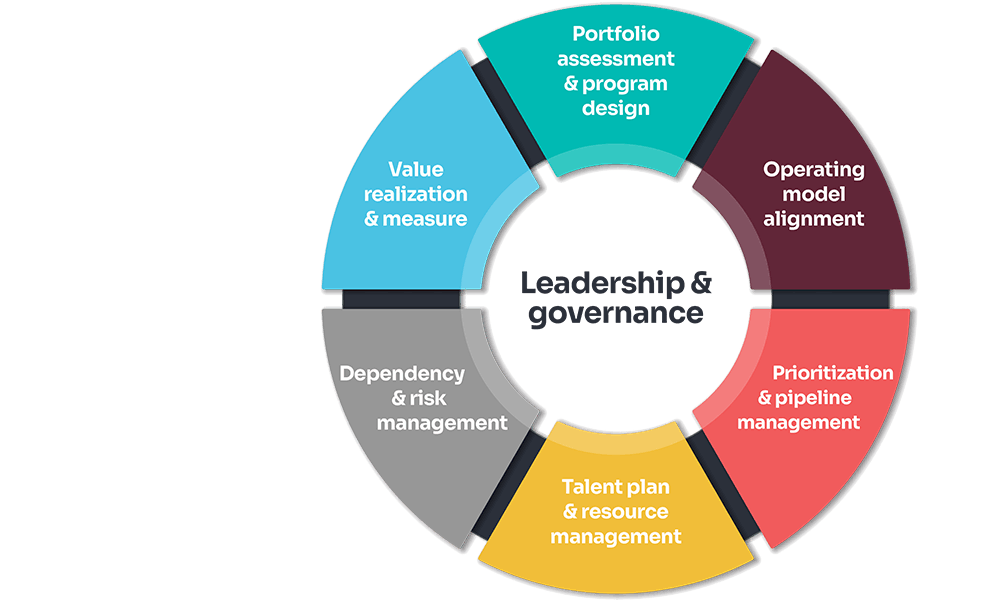
Why is effective program design and execution important?
Digital transformation isn’t simply adoption of technology for the purpose of spot efficiency gains. It’s a foundational change, integrating digital technology into all areas of a business, fundamentally changing how businesses operate and deliver value to customers. Sometimes that involves turning business and organizational models on their head and in others, it’s more of an evolution that unlocks further value in current models through the lens of technology.
In all cases, the work required for digital transformation is a mixture of different initiatives that are all directed toward a common, shared goal. Yet surprisingly, one often overlooked discipline necessary for digital transformation success is program design and execution.
For a true digital transformation, program design is critical for assembling and aligning initiatives in a manner that harnesses their collective power but is also not restrictive to the goals and objectives of each. Good program design makes the management and governance of execution easier.
Businesses often look internally to design and lead digital transformation programs as a secondary exercise, choosing to invest in external partners to collaborate with their subject matter leaders in the individual initiatives of the program. Putting the collective muscle where it can create the most momentum isn’t wrong, it just isn’t complete. Programs that grow organically rather than being intentionally designed are most often unsuccessful in meeting expectations and take an unnecessary toll on leadership when it comes to effectively steering the business.
Businesses eventually realize that they simply do not have enough time or manpower to plan, develop and execute their program. They spend the majority of their time governing the program and not nearly enough time participating in critical conversations that actually drive the program forward. So rather than delivering value, they find themselves simply documenting and controlling the program, merely striving to keep it afloat. This can result in:
- Busted budgets: Approximately 28% of businesses that launch digital transformations go over budget (IFS, 2020)
- Missed timelines: Roughly 33% of businesses overrun their planned timeline (IFS, 2020)
- Lack of a return on investment: The ability to deliver a measurable and sufficient return on technology investment quickly is the number one concern for roughly 64% of decision-makers today (IFS, 2020)
Businesses that take the “everyone get in the boat and row” mindset often discover that their employees don’t necessarily know how to row properly and cohesively, resulting in the boat either not reaching the destination at all or getting there very slowly while exhausting and demoralizing the rowers. Think of intentional program design and execution as the coxswain, effectively steering the boat, gauging rhythm, and giving direction to the rowers. Leaving shore without establishing a coxswain, or nominating one mid-trip, certainly is a difficult prospect.
What is program design and execution?
Program design and execution includes the examination and continual refinement of your existing (or planned) program structure and governance processes, in the context of your broader transformational priorities.
We begin with:
- An assessment of your current program design and management capabilities - including auditing the quality of in-progress projects, as appropriate
- An outline of recommended methodologies, control mechanisms and supporting execution and measurement capabilities
- The agility and iteration options necessary to collaborate across functions while ensuring the governance required to ensure focus and an aligned investment
To capture the intended value from your digital transformation program, it is important that each initiative can operate effectively without the undue weight of a “one size fits all” governance policies. We allow for appropriate variability in the delivery methods (agile, hybrid and in some cases even waterfall) of each program initiative when constructing the overall program operating structure and governance.
Key areas of focus
While ultimately every program is unique, there remains a common framework for orchestrating a coordinated effort across a multitude of program work components. Moreover, these components come with a high degree of uncertainty and ambiguity. There is not a pre-defined recipe for truly transformative initiatives but there are seven key areas that we focus on.

These seven dimensions tend to predict success when it comes to a program’s functionality and performance. We use these seven pivotal areas to help develop a set of governance activities that have the right focus and cadence for your specific program. This allows you to understand how to run the program while maintaining the necessary visibility and optionality to make changes throughout the process.
We’re here to help
Regardless of where your company is in the transformation process, Baker Tilly's digital team can jump into it at virtually any stage of the life cycle. We can help plan and run your program, or we can simply assess an existing program to ensure the goals and objectives of each individual initiative are aligned to, and in support of, the objectives of the program, with a good understanding of the interdependencies amongst the initiatives necessary to effectively govern execution.
Whether you want to create, improve or enhance your program, Baker Tilly can set your organization up for digital transformation success. For more information about Baker Tilly’s program design and execution services, or to discuss how we may be able to assist your organization, contact us.
